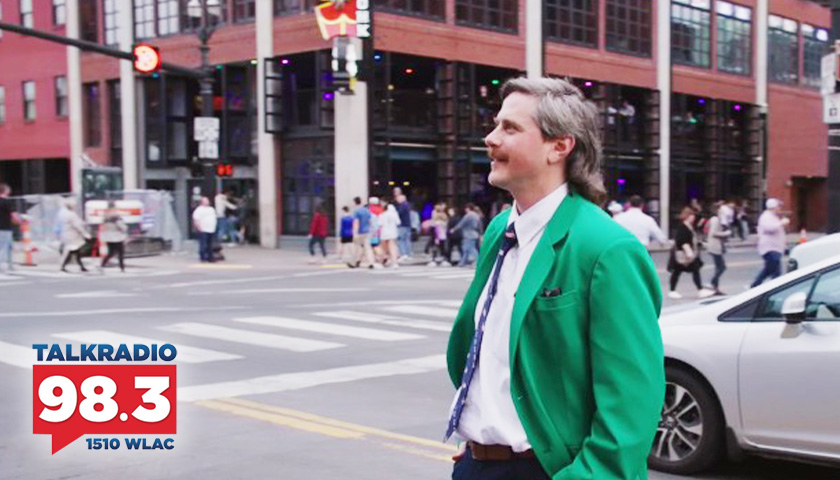Live from Music Row Tuesday morning on The Tennessee Star Report with Michael Patrick Leahy – broadcast on Nashville’s Talk Radio 98.3 and 1510 WLAC weekdays from 5:00 a.m. to 8:00 a.m. – host Leahy welcomed GOP judicial candidate for Davidson County Division 9, Brian Horowitz, in-studio to discuss why he’s the preferred candidate over the incumbent and what it will take to win the race.
Leahy: Our guest in-studio, Brian Horowitz, the Republican nominee for General Sessions Court Division 9 here in Davidson County. This will be a countywide election in Davidson County on August 4th. As far as I know, you are one of the only Republicans on the ballot in many precincts here.
There were a couple of school board races where they were on the ballot, but you were the only Republican on the ballot in many parts of the county in the primary.
Horowitz: That is correct. I am the only Republican judicial candidate, and unless you have a school board race, more than likely I’m the only Republican on your ballot.
If you went and voted on May 3rd, it would be a pretty lonely place to be on the Republican ballot, and I’m trying to change that.
Leahy: So the big question for you is, can a Republican win countywide in Davidson County?
Horowitz: A resounding, yes. Yes we can.
Leahy: But let’s look at the numbers. It’s 65 Democrats, and 35 Republicans, generally speaking. And you have a hardcore of left-wing lunatics in that 65?
I don’t know. Is it 35 percent that’s lunatic or 40 percent? But they elect lunatics to the school board all the time. They elect lunatics to the City Council.
I don’t know about the judges because I haven’t looked into that. But how do you appeal? Clearly, you can get the 35 percent of hardcore Republicans, but how do you get that extra 16 percent to get to the magic 51 percent?
Horowitz: I think we’re fortunate to have a very good judiciary, and I think that while you can have something that’s good, you can always make that better. And it’s important that we noticed that, yes, there’s a 65/35 split, potentially.
But if you look at that number, you’re assuming that everybody’s voting. And so we both know that a very small percentage of voters actually vote. So that means Republicans just have to vote more.
And if their percentage votes more than the majority percentage, then you have a chance to flip a seat. You have the chance to win an election. But you can’t win an election if you don’t have somebody to vote for.
And so I would love to see more Republican candidates stick their neck out there and try to make Nashville a better place. I think that Nashville would be a much stronger city.
And we are the It City. On the outside looking in, we’re a shining star. But for those of us who live here, we know that there are some issues that are underneath the surface.
And I think that a more balanced Republican and Democrat leadership, a more balanced Council, a more balanced school board, would lead to better outcomes for the people of Nashville.
Leahy: Now the Democrats have a nominee.
Horowitz: They do.
Leahy: Who is that nominee, and how do you compare to that candidate?
Horowitz: My opponent is a sitting judge. Her name is Linda Jones, and I know that she has her supporters, and she has a lot of people that think that she’s done a great job.
And we are priding ourselves in running a positive campaign. I wish her luck on the campaign trail. However, I do hope to be victorious on August 4th.
Leahy: So that sort of begs the question … I mean, if you think she’s so wonderful, why are you running against her?
Horowitz: Because I think that while she does a good job, but I think it can be done better.
Leahy: How could she do a better job? Let’s get to the point where she is weak, in your view.
Horowitz: So, I think that she could do a better job at informing defendants in her criminal courtroom of their rights.
Leahy: Has she failed to do that in some of these cases?
Horowitz: I don’t know that. I’m not going to say that she’s failed to do anything. But what I will say is that I would like to see if you cannot afford an attorney, one will be provided for you. And sometimes I wish, not sometimes I do wish that that speech would come before asking about guilt or innocence.
Leahy: Let’s talk about when you’re running for a judgeship here and there’s an incumbent judge of the other party. Now, your approach to your opponent is a kind of gentler approach, shall we say.
Horowitz: Very much so.
Leahy: Then if somebody was running for Congress against an incumbent Democrat, they would be throwing jabs all over the place. They would be attacking them. Is there some element of, I don’t know, judicial respect here that goes across the board?
Horowitz: Absolutely. And remember, I’m a judicial candidate. I can make two promises: that you’ll get a fair shake in my courtroom and that I will obey the law.
Leahy: Have you had cases before this judge?
Horowitz: I have.
Leahy: And what was your experience?
Horowitz: My experience was in one of my cases, and this is completely within her jurisdiction, within her power. But she did not accept a deal that I crafted with the district attorney, and that frustrated me because I felt that I had spoken with the officer, I had spoken with the district attorney.
I knew my client, and I knew that there’s a solution that would, A, be punishment for the crime, B, be a deterrent for future crimes, and C, have a rehabilitative component to it.
And what many people don’t know is I actually went to school down in Williamson County at the time. It’s now in Southern Davidson County, called Benton Hall Academy.
And Benton Hall Academy, I sit on the board of it today, and it’s a small school for children who learn differently. And it helped me tremendously. It helped me learn how to learn, but what it taught me – and it has a six-to-one student-to-teacher ratio – I can’t speak enough about that place because it changed my life. But it also helped me understand that the students there, just like the people in my courtroom, they get it. But you have to deliver the information in a different way.
Leahy: What was the resolution in that particular case?
Horowitz: The resolution in that particular case was a resolution that was far more detrimental to my client than necessary.
Leahy: Still more time in jail than you wanted.
Horowitz: That speaks loudly because, as a judge, I think that it’s important to let the district attorneys and the defense attorneys who know the case and if they come up with a solution, I think that you should give that a lot of difference.
Leahy: How much does a General Sessions court judge make?
Horowitz: The salary is about $177,000 a year.
Leahy: Will you make more as a General Sessions court judge than you do as an attorney?
Horowitz: If you look at my trajectory by the middle of next year, I will be taking a pay cut to be a judge, if I continue to meet my metrics and I continue to grow my practice the way I have.
Leahy: Your trajectory, meaning you haven’t quite reached that yet?
Horowitz: I have not quite reached that yet.
Leahy: So let’s talk about money. How much money is it going to take to win this race and how much do you have?
Horowitz: I believe that it’s going to take about $75,000 to $100,000 to run this race adequately.
– – –
Tune in weekdays from 5:00 – 8:00 a.m. to The Tennessee Star Report with Michael Patrick Leahy on Talk Radio 98.3 FM WLAC 1510. Listen online at iHeart Radio.





